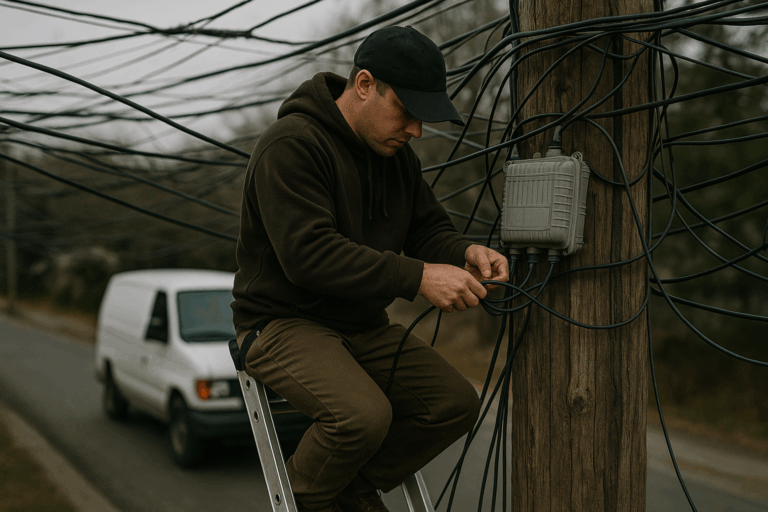When Cable Bills Climb, So Do People; up the Poles
If you’ve ever traveled outside the U.S.—to parts of Latin America, Southeast Asia, or the Caribbean—you’ve probably seen it: that obnoxious nest of wires hanging from poles like spaghetti having a nervous breakdown. It’s chaotic. It’s risky. And it’s totally functional. In places where electricity and cable TV can be considered luxuries, folks will literally climb poles and tap in, DIY-style. It’s either that or nothing—and “nothing” doesn’t exactly pair well with dinner and reruns.
But here in the good ol’ USA? Land of the oversold bundle and the $250 “limited time” cable package? You’d think we’d be past that kind of thing.
We’re not.
Turns out, both types of cable theft are alive and rising in the land of the free:
-
Signal theft – the old-school “get free cable” hustle.
-
Wire theft – stealing the actual copper or fiber for scrap metal or resale.
Let’s break it down.
1. When You Steal the Service (Signal Theft)
This is the classic kind of cable theft—back when people used to just pop off the line trap that techs installed right before the coax entered the house. Or when that mysterious neighbor (the one who always had a van but never a job) quietly ran a splitter from your drop to theirs. Still happens, believe it or not—if you’re gutsy enough to shimmy up the pole and tap into the feed like it’s the cable version of Mission: Impossible.
But nowadays? It’s gone digital—and sneakier. Usually it’s one guy willing to take all the legal risk: he pays for the full TV package, cracks it, and then resells it to a crowd of locals through jailbroken Rokus, Firesticks, or sketchy apps you won’t find in any app store. The buyers? They know exactly what they’re doing—$20 a month for 1,000 channels and every pay-per-view under the sun? Please. But as long as it mostly works (despite the constant buffering from 10,000 other freeloaders), they don’t ask questions.
It’s kind of like the drug game: the dealers do time, the users just say, “Hey man, I was just holding it for a friend.”
Case in point:
In New Jersey, YouTuber “Omi in a Hellcat” ran a full-blown cable piracy empire. He intercepted legit TV signals, repackaged them, and resold access for $15/month. People flocked to it—because no one likes paying $180 for a package bloated with shopping channels and reruns.
He made millions.
Then the feds showed up.
Now he’s likely watching Grey’s Anatomy behind bars—if they get ABC in federal lockup. (And let’s be honest, it probably pixelates just like those sketchy streams.)
2. When You Steal the Wires Themselves (Material Theft)
This one’s a little more hands-on. Think guys in reflective vests pulling copper out of utility lines and vanishing before sunrise.
Remember the 2008 recession?
As the economy tanked, metal prices shot up, and suddenly copper was worth more per pound than your kid’s first bike. Thieves hit everything: HVAC units, abandoned homes, even churches, seeking copper plumbing. But fast-forward to today: most new homes use PEX plastic plumbing, not copper. So where do modern-day scrap bandits look now?
You guessed it—cable wires. Where the thieves then turn the scores into the scrapyards and get paid for their mother lodes. And sure, scrapyards are required to take IDs (if real ones are used) to help reduce theft. Yet, they are a business too, and often knowingly let the obvious piles of wires slip onto the scales with a wink and a payout.
But sometimes, the scrapyards do indeed help authorities. Especially when their own internet goes down.
In Jacksonville, FL, nine people were busted for pretending to be utility workers, then ripping out active cable lines to harvest the copper. Thousands lost service, and thousands more had to pay for the cleanup. It wasn’t just theft—it was infrastructure sabotage in a reflective vest. Many lost not only their cable TV service, but also their internet. But hey, at least antenna owners still managed to get by, never even noticing a loss in their TV signals.
Another case in St. Gabriel, Louisiana saw one guy take out an entire neighborhood’s fiber optic line, causing $51,000 in damage just to make a few bucks. He fled the state. Spoiler: didn’t work.
Not everyone who wears capes are heroes, and not everyone who wears a reflective vest is an actual utility worker.
So Why’s This Happening in a “First World Country”?
Simple. Desperation meets inflation. Doesn’t matter what part of the world one lives.
When you’re paying car-note prices for TV, the idea of “free” cable (or selling scrap for rent money) starts sounding less like crime and more like survival.
Cable companies don’t help their case either. They’ve raised prices, tacked on mysterious “package fees,” and locked people into contracts with more fine print than a pharmaceutical ad. Where “sudden death” is merely a side effect of opening this month’s bill. Essentially, overpriced services only encourages theft, not deter it.
So whether it’s wire tap theft, digital pirates reselling live TV, or scrap hustlers yanking wire out of the ground, the root cause is the same: people are sick of being gouged for a service that will empty a bank account and leave nothing to show for it.
The Legal, Safe, and 100% Arrest-Free Alternative
You don’t need to risk jail time to watch TV.
You just need an antenna—a well-installed, professionally aimed, weather-resistant, no-monthly-bill antenna. ABC, NBC, CBS, FOX, PBS, and a slew of bonus channels you didn’t know existed. That’s 50–60 channels in most of West Michigan, free, legal, and sharper than most paid streams.
No monthly charges.
No tapping into wiring.
No trench coat cable deals.
No “warrant served at 4 a.m.” headlines.
Final Thought: Don’t Steal What’s Already Free
Whether it’s a guy on a pole in the Caribbean or a suburban bandit in Grand Rapids, one thing’s clear: when access to basic services gets pushed out of reach, people will get creative.
But here’s your reminder:
In the antenna world, you don’t need to get creative—you just need to get installed.
– Jeramie, Transition TV
Local antenna installer, wire-tangle untangler, and proud advocate of not ending up in a court docket for catching Jeopardy in HD




